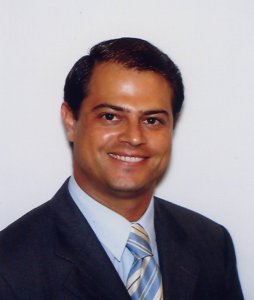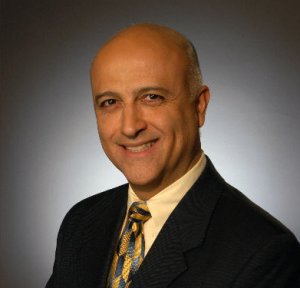Posted by Elena del Valle on August 3, 2006


Elena del Valle and Martha E. Galindo
Photos: LNA, Galindo Publicidad
The Boca Raton News, a South Florida daily, recently published an article about HispanicMPR.com in the Business Section. Written by Staff Writer Corey Siggins, the article was entitled “Website helps PR firms reach out to Hispanic community.”
The article described the HispanicMPR.com website and its features such as email subscription, podcast and new Resources Section. Siggins interviewed Elena del Valle, HispanicMPR.com editor, and Martha Galindo, CEO, Galindo Publicidad and HispanicMPR.com subscriber for the article, which was published in the print and online editions of the Boca Raton News on July 28, 2006.
The Boca Raton News focuses on local happenings in Boca Raton and Delray Beach, Florida. The article is available online at Boca Raton News
Posted by Elena del Valle on July 11, 2006
Sergio Sanchez, director of Hispanic brand initiatives, Sallie Mae
Photos: Sallie Mae, USA Funds
Reston, Virginia — Sallie Mae® and USA Funds® recently unveiled 2Futuro, a new college-financing and outreach program for Hispanic students and their parents which will be available in the fall. According to Sallie Mae and USA Funds representatives, 2Futuro is the only fully bilingual college-financing and outreach program that enables Hispanic parents and students to apply for college loans in Spanish. The program, currently available in four states, offers dedicated Spanish-language customer service support to students, parents, and financial-aid administrators. It also offers access to scholarships, grants and financial-aid information through the Spanish-first fully bilingual 2Futuro website.
“2Futuro was created to help Hispanic students achieve their dreams of postsecondary education,” said Sergio Sanchez, director of Hispanic brand initiatives, Sallie Mae. “More importantly, 2Futuro helps to integrate parents of Hispanic students into the process and helps them make the best possible college-financing decisions.”
According to the non-profit Hispanic Scholarship Fund, Hispanics are the nation’s largest ethnic-minority group and the fastest-growing segment of our population, yet they have some of the lowest college graduation rates of any group (estimated at 10 percent). Figures from the National Center for Education Statistics indicate that in 2000 Hispanics accounted for 7 percent of students enrolled at four-year institutions.
Henry Fernandez, executive director
Scholarships, Outreach and philanthropy, USA Funds
“Providing better information to this community about the value of a college education and the steps families need to take to prepare for college is a key to increasing the college-going and graduation rates of Hispanics,” said Henry Fernandez, executive director of scholarships, outreach and philanthropy, USA Funds.
Proponents expect to facilitate the loan process work of higher educational institutions. By offering online loan applications in Spanish and English, 2Futuro may be a tool for schools to communicate with their bilingual borrowers. This in turn could assist schools to improve enrollment rates by raising their visibility in the Hispanic community. 2Futuro will provide access to loan benefits through Sallie Mae’s family of lenders. All 2Futuro loans will be guaranteed by USA Funds.
Sallie Mae’s philanthropic arm, The Sallie Mae Fund, recently concluded its second nationwide Paying for College Bus Tour. This year’s bus tour granted $164,000 in scholarships. Organizers estimate that the program provided college outreach and counseling services to 45,000 Hispanic students at 77 locations.
Sallie Mae is a leading provider of education funding, and USA Funds is a leading education-loan guarantor. Additional information about 2Futuro is available online at 2futuro.com
Posted by Elena del Valle on July 6, 2006
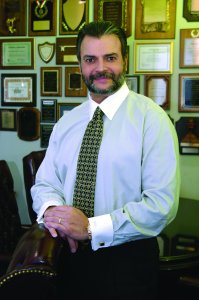
George L. San Jose, president and COO, San Jose Group
Photo: The San Jose Group
Chicago, Illinois – The San Jose Group’s “El cerdo es bueno” campaign earned a 2006 Bronze EFFIE® Award as the “best Hispanic marketing program of the year.” According to The San Jose Group representatives, the campaign increased pork consumption among Hispanics despite their initial misconceptions about pork’s health benefits and quality.
“Our office literally erupted in cheer when we were notified that we won an EFFIE,” said George L. San Jose, president and COO, The San Jose Group. “We pride ourselves on delivering results for our clients. To have our campaign judged as the year’s best in our industry is a career highlight for our team.”
“We are absolutely thrilled. It shows that we are not only capable of changing this by a margin, but we radically changed consumer behavior,” said Jennifer Woods, executive vice president, The San Jose Group. “We changed perspective and behavior which ultimately increases sales.”
The company launched the campaign, which translates into “Pork is good,” in 2002 on behalf of the National Pork Board to promote “the other white meat” to Hispanics. Initial research revealed that Hispanics had misconceptions about pork. Many thought pork was unhealthy because of its fat and cholesterol content and that it posed health risks like trichinosis, a parasitic disease caused by eating raw or undercooked pork.
Utilizing television, outdoor, radio and print advertising, website development, retail promotions and public relations, The San Jose Group embarked on an integrated marketing campaign to convince Hispanics that pork is healthy and safe to eat. The public relations component included an intense media relations effort that enlisted sources to provide culturally relevant information about pork’s nutritional value as well as pork production and quality control practices in the United States.
The San Jose Group believes that the campaign resulted in a 75 percent increase in pork purchase among Hispanics. Company representatives estimate that the editorial coverage they secured approximated 31 million gross impressions, and the equivalent of $1.7 million in media value.
The EFFIE® Award, sponsored by the New York American Marketing Association, is said to honor results. The San Jose Group, one of the oldest independent Hispanic marketing agencies in the U.S., was the only Hispanic agency to receive an EFFIE® this year. The San Jose Group is a consortium of marketing communications companies specializing in reaching the Spanish-speaking Americas. — Sergio Carmona
Posted by Elena del Valle on July 5, 2006
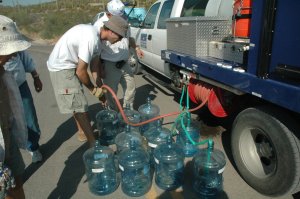
Humane Borders volunteers fill water bottles
Photos: Kent Brodie
Los Angeles, California – Victor Favela, president of Delgada y 30, plans to place $60 bottles of his weight loss product throughout the Arizona desert. Why, you may wonder. According to Favela, due to drastic measures in areas of California and Texas by the Department of Homeland Security Border Patrol and civilian militias, more than 40 percent of undocumented immigrants crossing the border in the last weeks have been forced to cross through the Sonora dessert in Arizona.
The former surgical technologist is not alone in his resistance to U.S. border policy. Concerned members of local nonprofit organizations have been helping for years. Paisanos al Rescate has been using low-flying planes to drop water bottles in the desert; and Humane Borders, a nonprofit organization based in Tucson, Arizona, maintains water stations in the desert.
Faith motivated Humane Borders offers humanitarian assistance through more than 83 emergency water stations on and near the U.S.-Mexican border. Paisanos al Rescate, a volunteer driven nonprofit, drops water and information with parachutes along the Texas, New Mexico, Arizona and California borders with Mexico. The chutes include methods for recipients to signal the aircraft in a life threatening situation. In those cases, Paisanos al Rescate will assist in coordinating rescue efforts with the U.S. Border Patrol Search and Rescue (BORSTAR).
“More than 2,000 undocumented immigrants have died in the desert since 1998,” said Favela. “It’s sickening to see so many people die unnecessarily. There is an all natural ingredient called pepino espinoso in every capsule of my product. It’s made from a cactus like plant discovered over 2,300 years ago by an ancient tribe of the Kalahari desert in South Africa. They’ve been using it for centuries to curb appetite and thirst while they trek across the desert.”
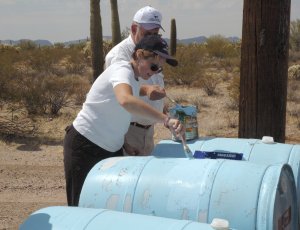
Painting water tanks
Water distribution has saved many lives. But according to volunteers, dropping drugs or other substances in the dessert could be dangerous to people and animals. Not everyone agrees that distributing weight loss products in the dessert is a good idea.
“We’ve given away over 75,000 gallons (of water) in five years and we know that people are alive today because they had water from our water stations. I would be against any kind of drug or substance that alters their perception of what their body needs,” said Sue Goodman, executive director of Humane Borders. “It’s very scary.”
The Humane Borders, a 501(c) (3) organization established in 2000 by Rev. Robin Hoover, water stations vary. Some consist of one 65-gallon barrel of water and others may have a dozen barrels, emergency rations, first aid kits and, in winter, warm clothes. Through collaboration with authorities, such as the U.S. Border Patrol and Consulate of Mexico, Humane Border representatives have a detailed map they use to determine the location of the stations on public and private lands.
Hundreds of volunteers, including 60 trained drivers, head out to the desert for 70 trips each week. They maintain the stations, refilling the water barrels, picking up discarded items and reporting vandalism. More information is available online at HumaneBorders.org and PaisanosAlRescate.org
Posted by Elena del Valle on June 29, 2006
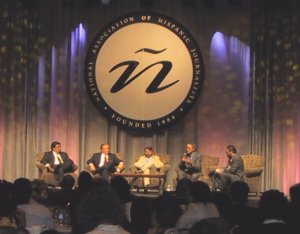
Lunch panelists Ray Suarez, Rev. David Beckmann, Lou Dobbs, Jorge Castañeda, and The Honorable Bill Richardson
Photos: Elena del Valle and Melissa Gonzalez
The National Association of Hispanic Journalists (NAHJ) hosted its 24th annual Convention and Media Career Expo in Fort Lauderdale, Florida recently. More than 1,400 print, broadcast and online media representatives from across the country attended eighty workshops and seminars and took advantage of networking opportunities during the four days of the event.
Several of the presentations, including a day long workshop and a luncheon, one of the events with the highest attendance, focused on immigration issues. Ray Suarez moderated “The Great American Immigration Debate” with panelists Rev. David Beckmann, president, Bread for the World; Lou Dobbs, anchor and managing editor CNN’s Lou Dobbs Tonight; Jorge Castañeda, professor New York University, and The Honorable Bill Richardson, governor, New Mexico.
There were sessions in English and Spanish on dealing with stress, changes in media, photojournalism, and even the downfalls of using Spanglish, a blending of English and Spanish. Speakers and panelists ranged from network executives to newspaper columnists. Maria Elena Salinas, an Emmy-award winning anchor of Noticiero Univision, and Henry Alfaro, a newscaster and founding member of the California Chicano News Media Association, were inducted into the NAHJ Hall of Fame.
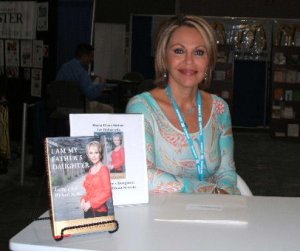
Maria Elena Salinas
Immigration reform was a constant theme throughout the Convention. Sometimes with so much emphasis the topic took over the seminar. This was the case in “Missing the Mark: Newsroom Diversity In a Time of Latino Activism” where Chicano activist Juan Jose Gutierrez called immigrant workers modern day slaves.
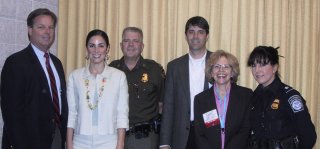
Panelists of the all-day workshop “Immigration-A Hand’s on Workshop for Better Coverage in Your Community”
A controversial interview took place via satellite with Ricardo Alarcon the president of the Cuban National Assembly. Among the topics discussed was the treatment of journalists in the communist nation.
The convention included a Media Career Expo where sponsors had booth space. Media represented in the exhibit space included South Florida newspapers the Sun Sentinel and The Miami Herald as well as national media such as ESPN and National Public Radio. — Melissa Gonzalez contributed to this article.
Posted by Elena del Valle on June 27, 2006

Yvonne Latty, author and NAHJ panelist
Photo: Andrea Cipriani
On Friday, June 16, a panel of journalists, anti-war activists, and Iraqi veterans voiced their concern for the media coverage of the Iraqi war and offered suggestions to improve the coverage of individual soldiers, particularly Hispanics, in the workshop “Through the Looking Glass: Latinos in the Iraqi war.” The panel was held during the National Association of Hispanics Journalists convention held at Greater Fort Lauderdale/Broward County Convention Center.
Art Ruson, anchor for KTRK-TV, was panel moderator. Also on the panel were Yvonne Latty, author of In Conflict: Iraq War Veterans Speak Out on Duty, Loss, and the Fight to Stay Alive; Curt L. Brownhill, Air Force Command chief master sergeant, United States Central Command; Jorge Medina, an anti-war activist who lost his son in the war; Camilo Mejia, former National Guard sergeant and conscientious objector to the war; and Juan Rodriguez, sergeant. They discussed the media’s emphasis on negative issues and the failure to focus on stories that could help people learn more about the purpose of Latino soldiers.
“A lot of people view Hispanics as undocumented immigrants with what’s going on in the media,” said Rodriguez following the workshop. “I would say (of) those who go to Iraq, 50 percent or more of those are Latinos. I think along with everything else you get labeled and it’s important to look closer because a lot of Hispanics are joining military because we are proud warriors and its part of our culture.”
During the workshop, the panelists discussed the lack of media coverage for Latino soldiers and their impression that because of it the public has differentiated Latino soldiers even though they were just as focused as any troop in Iraq. Panelists also mentioned that many stories were overlooked. Medina commented that media outlets didn’t do as much as they could to cover his son’s death.
The speakers also discussed war exaggerations, fabrications, and the notion that negative issues sell much more for the media. According to some of the panelists, this notion has created anxiety and frustrations for them, especially for Latty who was bashed by some media during her book tour. The presenters expressed their concern that the media’s focus may have prompted people to view these soldiers as villains; and their belief that many soldiers want the war to end. The closing thoughts for the workshop involved the panelists’ suggestions for ways to improve Hispanic soldier related coverage.
“There are so many stories in our neighborhood,” said Latty. “Go and interview them because I feel like Vietnam; vets may be seen as the bad guys.” Following the discussion, Latty provided ways to give a voice to Latinos. “Those who are coming home, we have to see who’s Latino and not be judgmental. Latino journalists should look into the community.” — Sergio Carmona
Posted by Elena del Valle on June 23, 2006
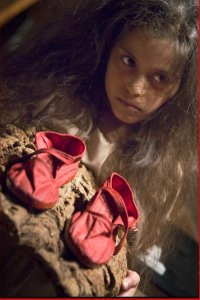
Little Soledad from “Soledad is Gone Forever”
Photo: Ron Koeberer
San Francisco, California – Haiku Films Producer and Director Mabel Valdiviezo will hold a benefit party, silent auction and sneak preview of the short film “Soledad Is Gone Forever” Friday, June 23 at 6 p.m. at the Cultural Center of the New College of California, 766 Valencia Street at 19th. The event is endorsed and supported by the School of Humanities of the New College of California and is sponsored by the Film Arts Foundation.
“We’re completing the shots and once it’s done we’ll be sending it to some of the festivals,” said Valdiviezo. “The goal to make the short film is to show the potential of the feature story.”
“Soledad Is Gone Forever,” a 14-minute film, is described by promoters as “a spellbinding, poetically haunting, psychological drama that explores the long-term human cost of state sponsored violence.”
Based on real accounts, the film is an intimate portrait of a young photographer, Soledad Gonzalez (Carla Ohana Sanchez), a child survivor of the Pinochet era. She witnessed the violent death of her father killed by the Chilean military twenty years ago and erased them from her memory. Through the film viewers follow Soledad’s journey filled with recurring visions and nightmares and her struggle to remain sane until she remembers her traumatic childhood.
Proceeds from the benefit will help fund the completion of the short film to be submitted to local and national film festivals. These contributions will also support the developing phase of the feature-length version of “Soledad Is Gone Forever.”
The silent auction will include a selection items from artists Carlos Cartagena, Martine Jardel, Ricardo Cartagena, Susana Aragon, Caleb Duarte, Indira Urrutia and Diallo John H. Jones. The auction will be followed by live music performed by Maria Loreto & Los Materos, Lalo Izquierdo, and Marina Lavalle & Rennea. Event sponsors are the New College of California, Le Beau Market, Rainbow Groceries, Conqueror Pisco, as Kodak, Spy Post and Outpost.
Valdiviezo, principal of Haiku Films, is a Peruvian born writer, director and producer of short films such as “The Water’s Muse” and “A Box Full Of Mirrors.” For information online, SoledadIsGoneForever.com
Posted by Elena del Valle on June 22, 2006
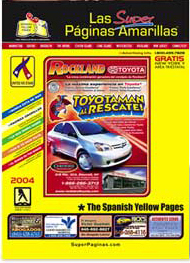
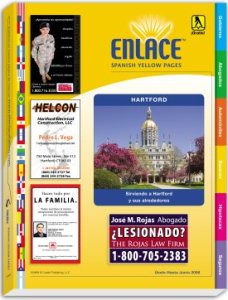
Enlace Yellow Pages in Spanish
Photo: Enlace
Louisville, Kentucky — Enlace Spanish Yellow Pages, one of the nation’s largest independent Spanish language directory companies (based on number of cities served), acquired Las Super Páginas Amarillas, an independent New York City area Spanish Yellow Pages directory. The directory, which targets the second largest Hispanic market in the United States, has grown exponentially over the last seven years.
The New York City directory covers the five boroughs of Manhattan, Queens, Brooklyn, The Bronx, and Staten Island as well as parts of Long Island, Westchester, Rockland, New Jersey and Connecticut. Acquisition benefits include a Manhattan based sales force and Enlace resources.
“Enlace now reaches over 19 million Hispanics across the country. This coverage includes four out of the top five largest Hispanic markets and seven of the top ten fastest growing Hispanic markets. No other Spanish language publisher offers this type of coverage,” said Jonathan Blue, managing director, Blue Equity, LLC, Enlace’s parent entity.
To further its promotional reach Enlace recently signed an endorsement agreement with SFX and Alex Aragon, an emerging PGA golfer from Mexico City. Aragon wears the Enlace logo on the lapel of his shirt. He is the second Hispanic athlete to participate in a sponsorship deal with Enlace. Earlier this year, Enlace launched billboard campaigns in Sacramento, California and Louisville, Kentucky that showcased Francisco Garcia, the Sacramento Kings NBA rookie from the Dominican Republic.
Established in December 2003, Enlace publishes 24 Spanish language directories in Alabama, Arkansas, California, Connecticut, Florida, Georgia, Indiana, Kansas, Kentucky, Louisiana, Missouri, Nevada, New York, North Carolina, Ohio, Tennessee and Texas. Enlace has become one of the fastest growing Spanish Yellow Pages publisher.
Enlace is a division of Cobalt Publishing, LLC, a subsidiary of Blue Equity, LLC. For information online visit ElEnlaceLatino.com. Blue Equity is a leading independent, regional, private equity firm based in Louisville, Kentucky.
Posted by Elena del Valle on June 15, 2006

Frank Ovaitt, president and CEO, Institute for Public Relations
Photos: Institute for Public Relations, State Farm
The Institute for Public Relations Issues recently issued a request for proposals and is offering grants to encourage new research about diversity, including Hispanic oriented practice, and public relations. The organization expects proposals to be submitted by educators, graduate students, and working professionals interested in diversity and public relations.
“This research program will focus on the science beneath the art of relationships with diverse constituents, communicating with diverse audiences, through diverse means, to support the value of diversity,” said Frank Ovaitt, president and CEO, Institute for Public Relations.
Funded by an initial contribution from ConAgra Foods, Inc., the Institute is seeking proposals from scholars and professionals for grant awards of $1,000 to $10,000 to fund studies in this area. The online application form and more information can be found at Instituteforpr.org.

Mike Fernandez, vice president, Corporate Communications & External Relations, State Farm Insurance
“Public relations is fundamentally about managing relationships for institutions, and how we identify and communicate with diverse groups is critical to success,” said Michael Fernandez, a trustee of the Institute who was previously senior vice president and chief communications officer, ConAgra Foods, and is now vice president, corporate Communications & External Relations, State Farm Insurance. “But the core notion of diversity itself is different and changing. This will have profound implications for the messages we craft and the public relations tools we use for years to come. The goal of this research effort is to make sure that the profession is adequately prepared to meet the challenges ahead.”
The Institute defines itself as an “independent nonprofit foundation dedicated to the science beneath the art of public relations, that exists “to build and document research-based knowledge in the field of public relations, and to mainstream this knowledge into practice.”
Posted by Elena del Valle on June 6, 2006
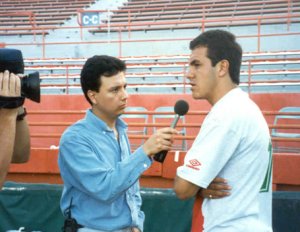
Fredy Wiles, Terra, senior producer, interviewing Mexican soccer player Cuahetemoc Blanco
Photo: Terra.com
Coral Gables, Florida – Terra.com leveraged the journalistic collaboration of Terra Networks’ regional sites to create a bilingual (English and Spanish) World Cup 2006 tournament website, Alemania 2006, focusing on the road to Berlin. Promoters describe it as “the largest, most complete site.”
They promise recaps of the Elimination Round, more than 2,000 photos detailing the history of previous World Cups and live reporting from Terra.com’s 10 international online correspondents. Website visitors can obtain team stats, calendars, team standings, videos, country information, a German travel special and advanced wireless features like mobile ring tones, scores, and alerts.
Additionally, soccer fans who follow the tournament online can receive minute-by-minute match coverage in Spanish and English, Terra TV (video-on-demand) including four original exclusive videos per day from Germany, online games, photo galleries, forums and blogs.
“Terra Networks’ journalistic collaboration offers World Cup fans unparalleled in-depth coverage and is a prime example of the Internet’s ability to reach a mass audience,” stated Fernando Rodriguez, CEO, Terra. “The Internet is fast becoming the media of choice for avid sports fans. Anyone with a browser and connectivity can actively partake.”
Terra.com served as the official site for the Copa Oro and offers fan clubs for Spanish teams, Barcelona and Real Madrid. Terra also features the teams and games of the Fútbol Mexicano, Copa Libertadores de America, and Copa Europa.
According to Terra executives, World Cup 2006 is set to reach an estimated 3 million spectators attending 64 matches that will be played in the German cities of Berlin, Munich, Frankfurt and Hannover. Millions are expected to follow the games on television, radio and online.
Terra Networks is an Internet group with a presence in the U.S. and Latin America operating websites in the United States, Spain and Latin America, and is among the largest access providers in Spain and Latin America. Terra.com is the U.S. Hispanic arm of the Terra Networks. Visit Terra.com for the Spanish website and Terra.com/shared for the English version.


